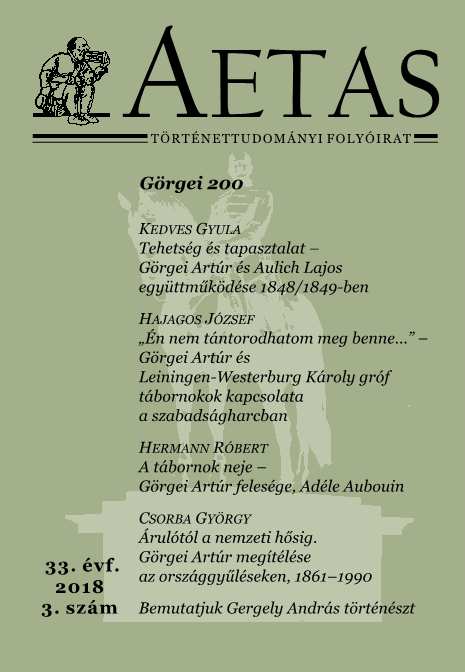„Én nem tántorodhatom meg benne…” Görgei Artúr és Leiningen-Westerburg Károly tábornokok kapcsolata a szabadságharcban
“I can’t lose my trust in him…” – the relationship between generals Artúr Görgei and Count Karl Leiningen-Westerburg during the Hungarian War of Independence of 1848-49
Author(s): József HajagosSubject(s): 19th Century
Published by: AETAS Könyv- és Lapkiadó Egyesület
Summary/Abstract: Conflicts between the military leaders of the War of Independence of 1848-49 were quite common. However, 31-year-old Artúr Görgei and 30-year-old Count Karl Leiningen- Westerburg formed a close friendship. They first met on 26 March 1849 at Poroszló, and despite their different backgrounds, Görgei made a good first impression on Leiningen. Görgei came from a gentry family, while Leiningen was the son of German aristocrats. Both of their immediate families had financial difficulties, and career as a military officer was a possible way to break out of this situation. However, Görgei left the military as a lieutenant in 1845, and first he started studying chemistry, then he became the manager of the domains of one of his aunts. Leiningen, who was an enthusiast of German national ideas, got married in 1844 and became a landowner in Hungary through his wife, Eliz Sissány. He wanted to retire to his lands and planned to leave the Habsburg military as a captain in 1848. The Revolution of 1848 and the war of self-defense following it changed both of their lives. Görgei began his service in the Hungarian Revolutionary Army as a captain in June 1848. His career advanced quickly, from November 1848 he was one of the most important leaders of the Hungarian army as a general. At the time of their first encounter, he was the commander of the VII Corps. Leiningen only volunteered to the Hungarian Minister of War in October 1848 because of the Serbian rebellion threatening his wife’s lands in Délvidék. He fought valiantly in the battles in Délvidék, even though he was treated with distrust. When he met Görgei he was a lieutenant colonel and one of the brigadiers of the III Corps. At the end of March 1849, Görgei was appointed temporary main commander of the Hungarian main army. Under his command, the Hungarian forces drove out the Austrians from the country in April, and in May they even managed to retake Buda. Görgei was the main commander, while Leiningen was one of the most successful and valiant subcommanders of the the successful counterattack. Their shared victories increased the two soldiers’ respect for each other, and their relationship evolved into friendship. They did all they could during the less successful summer campaign as well. On 20 June Leiningen assumed command of the III Corps, which consisted of excellent units, and he was soon promoted to the rank of major general. Leiningen considered Görgei his role model and identified with his political and military views. Görgei could always count on Leiningen’s support, even in the most difficult times. After the surrender to the Russians on 13 August, the Tsar could only secure the life of Görgei. The generals and officers handed over to the Austrians were court-martialed. Despite the accusations against Görgei Leiningen did not lose faith in his friends until his execution on 6 October.
Journal: AETAS - Történettudományi folyóirat
- Issue Year: 2018
- Issue No: 3
- Page Range: 23-36
- Page Count: 14
- Language: Hungarian

